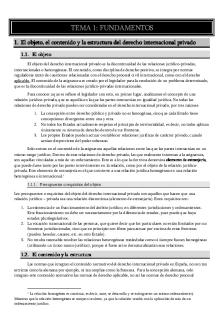Apuntes fundamentos PDF

| Title | Apuntes fundamentos |
|---|---|
| Course | Fundamentos Históricos del Sistema Jurídico |
| Institution | Universidad Carlos III de Madrid |
| Pages | 2 |
| File Size | 112.8 KB |
| File Type | |
| Total Downloads | 91 |
| Total Views | 155 |
Summary
Apuntes clase de fundamentos (inglés)...
Description
Marta Valdivia Derecho y ADE bilingüe
FUNDAMENTOS
HISTORICAL FOUNDATION OF THE LEGAL SYSTEM: Law and its existence is contemporary to the existence of humans, laws exist since the origins of humanity. Law: an expression of society more than an expression of state. During history we observe different understanding of law: Three experiences of the law in the historical civilizations: - Middle ages (IV-XV century) - Modern ages (XVI-XVII century) - Contemporary age (1789-today)
MIDDLE/ DARK AGES (476 A.C-1453/1492) Europe was divided in kingdoms (there was not one single power) Social model: people weren’t considered equal (feudalism) Differenciated by: - Place of birth - Social group (order of state, no social classes, it was almost impossible to move from one state to the other) - Profession - Religion - The king of whom one was subject - Gender 90% of the population were from the lowest state. Social differences were accepted as natural (reflect an elderly world). The order is given by God. There was a theocratic vision: men could only intervene in the order wanted by God to restore. The irrelevance of the individual (singulus) in the relation to the community (socius). Individuals had no rights as an individual, but only as a member of the group (CORPORATIVE SOCIETY). Political model: Customary law: one of the main sources of law tradition Jurisprudence Doctrinal law PLURAL Different political units around Europe Different social groups in the sovereignty of a political authority (different positions of power, legal pluralism) Plural power holders Iurisdictio: concept of power elaborated by medieval jurists. Term with which power was designated to declare and to state the law (not create because law was created by God) - Main function of the power holder: acting as a judge. Always superior - Contribute to the consolidation of a new particular power: Jurisdictional state Power holder already had a superior position than their subjects (led to absolutism 16th century)
Marta Valdivia Derecho y ADE bilingüe
LATE MIDDLE AGES (13-15th CENTURY) -
-
-
Transition between passive role of the king (king as a judge, waited to restore justice) to an active role as a legislator saying laws based on the word of God. The king is omnipresent (institution that represent him and act on his name). Coexistence of sources of law: royal law customary law ius commune: Combination of roman law, canon law (church) and feudal law. Birth of the parliament (1250 in England): composed by the high classes and wealthy people. It was not an absolute monarchy: agreement between king and kingdom (the kingdom controlled the activity of the king: pactium). This pact was not between equals, the king was always superior. As the king gained more territories more royal institutions were born (omnipresence)
MODERN NATURAL LAW: HUGO GROTIUS is considered to have initiated this new current theory - Natural - Secular (to discover law you don’t need any religious intervention) - Rational XVIIth century: mathematical/natural sciences provide a secure method to make discoveries Natural law is universal, It is not made by people, it is internal Positive law is not to everyone. CLASICAL/MEDIEVAL NATURAL LAW Natural law derives from cosmic nature: They analyse the nature of the cosmos To what end would modern natural law be employed? Modern natural law is going to legitimate absolutism. They are going to support absolute monarch. But also to legitimate liberalism. Idealization of the monarch: maximum interpreter of the law European enlightened made the holder of supreme political power: interpreter of natural law (the monarch: maximum interpreter) Each holder of supreme political power Enlightened despotism “everything for the people, nothing by the people” “Todo para el pueblo pero sin el pueblo.” Judicial absolutism Judge: ana gent of the monarch they are going tomcat in the name of the monarch
SOCIAL CONTRACT The society does not origin from god but from this fictional pact between the subjects and governors Voluntarily limit your freedom to be in a society The individual did not have rights as an individual Subjective rights: the power of will that is guaranteed to a specific subject VOLUNTARISM Voluntarily limit your rights and freedom to be in a society SCIENTIFICATION Human capacity to reduce law-to a few immutable principles that are scientifically valid...
Similar Free PDFs

Apuntes fundamentos
- 2 Pages

TEMA 1. Fundamentos - Apuntes 1
- 5 Pages

TEMA 4 Fundamentos - Apuntes 4
- 24 Pages

TEMA 3 Fundamentos - Apuntes 3
- 6 Pages

FASE 5 Fundamentos - Apuntes 3
- 5 Pages

Fundamentos de la matematica apuntes
- 54 Pages

Exercícios Fundamentos
- 4 Pages

Fundamentos. Temario
- 16 Pages

Resumen Fundamentos
- 34 Pages

II. Fundamentos
- 2 Pages
Popular Institutions
- Tinajero National High School - Annex
- Politeknik Caltex Riau
- Yokohama City University
- SGT University
- University of Al-Qadisiyah
- Divine Word College of Vigan
- Techniek College Rotterdam
- Universidade de Santiago
- Universiti Teknologi MARA Cawangan Johor Kampus Pasir Gudang
- Poltekkes Kemenkes Yogyakarta
- Baguio City National High School
- Colegio san marcos
- preparatoria uno
- Centro de Bachillerato Tecnológico Industrial y de Servicios No. 107
- Dalian Maritime University
- Quang Trung Secondary School
- Colegio Tecnológico en Informática
- Corporación Regional de Educación Superior
- Grupo CEDVA
- Dar Al Uloom University
- Centro de Estudios Preuniversitarios de la Universidad Nacional de Ingeniería
- 上智大学
- Aakash International School, Nuna Majara
- San Felipe Neri Catholic School
- Kang Chiao International School - New Taipei City
- Misamis Occidental National High School
- Institución Educativa Escuela Normal Juan Ladrilleros
- Kolehiyo ng Pantukan
- Batanes State College
- Instituto Continental
- Sekolah Menengah Kejuruan Kesehatan Kaltara (Tarakan)
- Colegio de La Inmaculada Concepcion - Cebu





